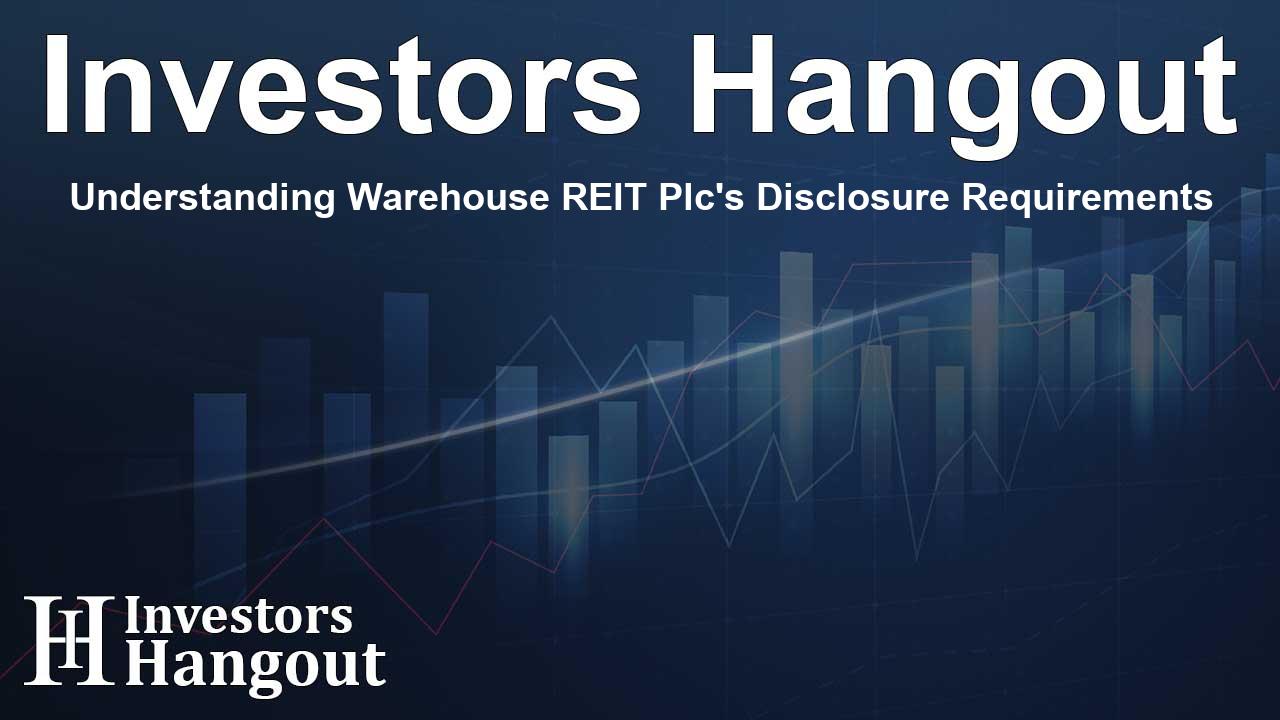Understanding Warehouse REIT Plc's Disclosure Requirements

Understanding Disclosure Requirements for Warehouse REIT Plc
In the financial world, transparency is paramount, and companies are required to disclose various details to their shareholders and potential investors. This article focuses on the specific disclosure requirements that apply to Warehouse REIT Plc, a prominent name on the London Stock Exchange (LSE:RAT). We will delve into the key information, the positions held by interested parties, and the essential dealings that need to be reported. These disclosures not only keep investors informed but also maintain the company's integrity within the marketplace.
Key Information Regarding Disclosure
When a person or entity has an interest in relevant securities that equate to 1% or more, they are obligated to release specific details to the public. In the case of Warehouse REIT Plc, important disclosures are made according to Rule 8.3 of the UK Takeover Code. Key pieces of information that need to be highlighted in disclosures include the names of the financial interests' holders, the nature of their dealings, and the timelines of these positions.
Disclosure by Rathbones Group Plc
One notable participant in this disclosure is Rathbones Group Plc, which has reported interests in Warehouse REIT Plc. They currently hold a substantial number of shares, totaling 52,228,338 1p ordinary shares, representing approximately 12.29% of the company's issued share capital. This level of shareholding emphasizes Rathbones' significant interest in Warehouse REIT, making it an influential player within the company's shareholder structure.
Positions of the Discloser
Detailing the positions held by Rathbones Group Plc further informs stakeholders of the landscape surrounding Warehouse REIT Plc. The position disclosures include not only the number of shares owned but also any potential short positions or derivatives associated with those shares. It’s crucial for stakeholders to have visibility of both interests and any short positions that Rathbones may hold.
Understanding Ownership and Control
Ownership and control of interests are paramount in financial disclosures. For any party involved, it is essential to acknowledge that nominee or vehicle companies do not qualify as valid disclosures. If the interest is held in trust, the trustees, settlors, or beneficiaries need to be named. For Rathbones, exact details about the owners of these interests have been made clear, ensuring transparency within this framework.
Documenting Dealings Related to the Offeror
Dealings refer to any purchase or sale of securities that must also be disclosed. Rathbones Group Plc has executed several transactions involving Warehouse REIT's shares. In their most recent activity, they have reported multiple sales of 1p ordinary shares at varying prices, all of which contribute to a clear picture of the trading activity associated with the REIT’s securities. Such details are critical for any potential investors looking at the trading patterns around Warehouse REIT Plc.
Cash-Settled Derivatives and Other Transactions
In addition to the ownership of shares, any transactions involving cash-settled derivatives also require disclosure. For Warehouse REIT, understanding how derivatives are managed provides deeper insight into the risk exposures and strategic positioning of Rathbones Group Plc. Furthermore, documenting stock-settled derivatives, including options, is vital for a complete understanding of the financial strategies at play.
Final Considerations on Public Disclosure Practices
Transparency is a linchpin in maintaining confidence between companies and their stakeholders. The details surrounding interests and dealings ensure that all market participants can make informed decisions. The obligations laid down by the Takeover Code compel stockholders to maintain a high level of diligence in their dealings and disclosures. As part of the compliance measures, the entity involved in these transactions must ensure that all public disclosures adhere to regulatory requirements.
Frequently Asked Questions
What is the purpose of disclosure requirements?
Disclosure requirements serve to maintain transparency in financial markets, ensuring investors have access to pertinent information that may affect their investment decisions.
Who is required to disclose their positions?
Any individual or entity with interests in relevant securities exceeding 1% must disclose their positions, including the nature and extent of these holdings.
What are the consequences of non-compliance?
Failure to comply with disclosure regulations can lead to regulatory action, fines, and a loss of investor confidence, affecting the company's standing in the market.
How often must disclosures be made?
Disclosures should be made promptly upon taking or altering positions, particularly when significant transactions occur, or there are changes in ownership percentages.
What is the relevance of cash-settled derivatives in disclosure?
Cash-settled derivatives provide insight into the financial strategies of investors, including their risk management approaches concerning the fundamental securities they are involved with.
About The Author
Contact Kelly Martin privately here. Or send an email with ATTN: Kelly Martin as the subject to contact@investorshangout.com.
About Investors Hangout
Investors Hangout is a leading online stock forum for financial discussion and learning, offering a wide range of free tools and resources. It draws in traders of all levels, who exchange market knowledge, investigate trading tactics, and keep an eye on industry developments in real time. Featuring financial articles, stock message boards, quotes, charts, company profiles, and live news updates. Through cooperative learning and a wealth of informational resources, it helps users from novices creating their first portfolios to experts honing their techniques. Join Investors Hangout today: https://investorshangout.com/
The content of this article is based on factual, publicly available information and does not represent legal, financial, or investment advice. Investors Hangout does not offer financial advice, and the author is not a licensed financial advisor. Consult a qualified advisor before making any financial or investment decisions based on this article. This article should not be considered advice to purchase, sell, or hold any securities or other investments. If any of the material provided here is inaccurate, please contact us for corrections.
